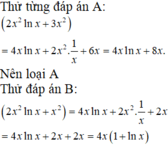Họ nguyên hàm của hàm số f x = 1 x + sin x là
A. ln x - cos x + C
B. - 1 x 2 - cos x + C
C. ln x + cos x + C
D. ln x - cos x + C
Hãy nhập câu hỏi của bạn vào đây, nếu là tài khoản VIP, bạn sẽ được ưu tiên trả lời.

Chọn A.
F ' ( x ) = sin x - cos x ' sin x - cos x = cos x + sin x sin x - cos x

Biến đổi :
\(5\sin x=a\left(2\sin x-\cos x+1\right)+b\left(2\cos x+\sin x\right)+c\)
= \(\left(2a+b\right)\sin x+\left(2b-a\right)\cos x+a+c\)
Đồng nhất hệ số hai tử số :
\(\begin{cases}2a+b=5\\2b-a=0\\a+c=0\end{cases}\)
\(\Rightarrow\) \(\begin{cases}a=2\\b=1\\c=-2\end{cases}\)
Khi đó :
\(f\left(x\right)=\frac{2\left(2\sin x-\cos x+1\right)+\left(2\cos x+\sin x\right)-2}{2\sin x-\cos x+1}\)
= \(2+\frac{2\cos x+\sin x}{2\sin x-\cos x+1}-\frac{2}{2\sin x-\cos x+1}\)
Do vậy :
\(I=2\int dx+\int\frac{\left(2\cos x+\sin x\right)dx}{2\sin x-\cos x+1}-2\int\frac{dx}{2\sin x-\cos x+1}\)
=\(2x+\ln\left|2\sin x-\cos x+1\right|-2J+C\)
Với
\(J=\int\frac{dx}{2\sin x-\cos x+1}\)

\(a,y'=8x^3-9x^2+10x\\ \Rightarrow y''=24x^2-18x+10\\ b,y'=\dfrac{2}{\left(3-x\right)^2}\\ \Rightarrow y''=\dfrac{4}{\left(3-x\right)^3}\)
\(c,y'=2cos2xcosx-sin2xsinx\\ \Rightarrow y''=-5sin\left(2x\right)cos\left(x\right)-4cos\left(2x\right)sin\left(x\right)\\ d,y'=-2e^{-2x+3}\\ \Rightarrow y''=4e^{-2x+3}\)

Biến đổi :
\(4\sin^2x+1=5\sin^2x+\cos^2x=\left(a\sin x+b\cos x\right)\left(\sqrt{3}\sin x+\cos x\right)+c\left(\sin^2x+\cos^2x\right)\)
\(=\left(a\sqrt{3}+c\right)\sin^2x+\left(a+b\sqrt{3}\right)\sin x.\cos x+\left(b+c\right)\cos^2x\)
Đồng nhấtheej số hai tử số
\(\begin{cases}a\sqrt{3}+c=5\\a+b\sqrt{3}=0\\b+c=1\end{cases}\)
\(\Leftrightarrow\) \(\begin{cases}a=\sqrt{3}\\b=-1\\c=2\end{cases}\)

Biến đổi :
\(4\sin x+3\cos x=A\left(\sin x+2\cos x\right)+B\left(\cos x-2\sin x\right)=\left(A-2B\right)\sin x+\left(2A+B\right)\cos x\)
Đồng nhất hệ số hai tử số, ta có :
\(\begin{cases}A-2B=4\\2A+B=3\end{cases}\)\(\Leftrightarrow\begin{cases}A=2\\B=-1\end{cases}\)
Khi đó \(f\left(x\right)=\frac{2\left(\left(\sin x+2\cos x\right)\right)-\left(\left(\sin x-2\cos x\right)\right)}{\left(\sin x+2\cos x\right)}=2-\frac{\cos x-2\sin x}{\sin x+2\cos x}\)
Do đó,
\(F\left(x\right)=\int f\left(x\right)dx=\int\left(2-\frac{\cos x-2\sin x}{\sin x+2\cos x}\right)dx=2\int dx-\int\frac{\left(\cos x-2\sin x\right)dx}{\sin x+2\cos x}=2x-\ln\left|\sin x+2\cos x\right|+C\)

Để kiểm tra một hàm F(x) có phải là một nguyên hàm của f(x) không thì ta chỉ cần kiểm tra F'(x) có bằng f(x) không?
a) \(F\left(x\right)\) là hằng số nên \(F'\left(x\right)=0\ne f\left(x\right)\)
b) \(G'\left(x\right)=2.\dfrac{1}{2}.\dfrac{1}{\cos^2x}=1+\tan^2x\)
c) \(H'\left(x\right)=\dfrac{\cos x}{1+\sin x}\)
d) \(K'\left(x\right)=-2.\dfrac{-\left(\dfrac{1}{2}.\dfrac{1}{\cos^2\dfrac{x}{2}}\right)}{\left(1+\tan\dfrac{x}{2}\right)^2}=\dfrac{\dfrac{1}{\cos^2\dfrac{x}{2}}}{\left(\dfrac{\cos\dfrac{x}{2}+\sin\dfrac{x}{2}}{\cos\dfrac{x}{2}}\right)^2}\)
\(=\dfrac{1}{\left(\cos\dfrac{x}{2}+\sin\dfrac{x}{2}\right)^2}=\dfrac{1}{1+2\cos\dfrac{x}{2}\sin\dfrac{x}{2}}\)
\(=\dfrac{1}{1+\sin x}\)
Vậy hàm số K(x) là một nguyên hàm của f(x).

a: \(y'=4\cdot3x^2-3\cdot2x+2=12x^2-6x+2\)
b: \(y'=\dfrac{\left(x+1\right)'\left(x-1\right)-\left(x+1\right)\left(x-1\right)'}{\left(x-1\right)^2}=\dfrac{x-1-x-1}{\left(x-1\right)^2}=\dfrac{-2}{\left(x-1\right)^2}\)
c: \(y'=-2\cdot\left(\sqrt{x}\cdot x\right)'\)
\(=-2\cdot\left(\dfrac{x+x}{2\sqrt{x}}\right)=-2\cdot\dfrac{2x}{2\sqrt{x}}=-2\sqrt{x}\)
d: \(y'=\left(3sinx+4cosx-tanx\right)\)'
\(=3cosx-4sinx+\dfrac{1}{cos^2x}\)
e: \(y'=\left(4^x+2e^x\right)'\)
\(=4^x\cdot ln4+2\cdot e^x\)
f: \(y'=\left(x\cdot lnx\right)'=lnx+1\)

Đáp án D
Phương pháp:
Cách 1: Sử dụng công thức tính nguyên hàm của 1 tổng.
Cách 2: Đạo hàm từng đáp án của đề bài, kết quả nào ra đúng f(x) thì đó là đáp án đúng
Cách giải:

⇒ 2 x 2 ln x + x 2 là một nguyên hàm của hàm số f x = 4 x 1 + ln x
⇒ Họ nguyên hàm của hàm số f x = 4 x 1 + ln x là 2 x 2 ln x + x 2 + C

a: \(y'=\left(x^2+2x\right)'\left(x^3-3x\right)+\left(x^2+2x\right)\left(x^3-3x\right)'\)
\(=\left(2x+2\right)\left(x^3-3x\right)+\left(x^2+2x\right)\left(3x^2-3\right)\)
\(=2x^4-6x^2+2x^3-6x+3x^4-3x^2+6x^3-6x\)
\(=5x^4+8x^3-9x^2-12x\)
b: y=1/-2x+5
=>\(y'=\dfrac{2}{\left(2x+5\right)^2}\)
c: \(y'=\dfrac{\left(4x+5\right)'}{2\sqrt{4x+5}}=\dfrac{4}{2\sqrt{4x+5}}=\dfrac{2}{\sqrt{4x+5}}\)
d: \(y'=\left(sinx\right)'\cdot cosx+\left(sinx\right)\cdot\left(cosx\right)'\)
\(=cos^2x-sin^2x=cos2x\)
e: \(y=x\cdot e^x\)
=>\(y'=e^x+x\cdot e^x\)
f: \(y=ln^2x\)
=>\(y'=\dfrac{\left(-1\right)}{x^2}=-\dfrac{1}{x^2}\)
Đáp án D
Phương pháp:
Sử dụng công thức nguyên hàm các hàm số cơ bản và tính chất nguyên hàm.
Cách giải: